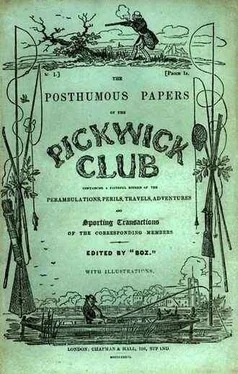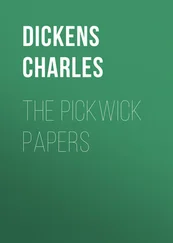Mr. Weller was at first obstinately determined on cashing the cheque in nothing but sovereigns; but it being represented by the umpires that by so doing he must incur the expense of a small sack to carry them home in, he consented to receive the amount in five–pound notes.
‘My son,’ said Mr. Weller, as they came out of the banking–house — ‘my son and me has a wery partickler engagement this arternoon, and I should like to have this here bis’ness settled out of hand, so let’s jest go straight avay someveres, vere ve can hordit the accounts.’
A quiet room was soon found, and the accounts were produced and audited. Mr. Pell’s bill was taxed by Sam, and some charges were disallowed by the umpires; but, notwithstanding Mr. Pell’s declaration, accompanied with many solemn asseverations that they were really too hard upon him, it was by very many degrees the best professional job he had ever had, and one on which he boarded, lodged, and washed, for six months afterwards.
The umpires having partaken of a dram, shook hands and departed, as they had to drive out of town that night. Mr. Solomon Pell, finding that nothing more was going forward, either in the eating or drinking way, took a friendly leave, and Sam and his father were left alone.
‘There!’ said Mr. Weller, thrusting his pocket–book in his side pocket. ‘Vith the bills for the lease, and that, there’s eleven hundred and eighty pound here. Now, Samivel, my boy, turn the horses’ heads to the George and Wulter!’
Chapter 56
An important Conference takes place between Mr. Pickwick and Samuel Weller, at which his Parent assists — An old Gentleman in a snuff–coloured Suit arrives unexpectedly
Mr. Pickwick was sitting alone, musing over many things, and thinking among other considerations how he could best provide for the young couple whose present unsettled condition was matter of constant regret and anxiety to him, when Mary stepped lightly into the room, and, advancing to the table, said, rather hastily—
‘Oh, if you please, Sir, Samuel is downstairs, and he says may his father see you?’
‘Surely,’ replied Mr. Pickwick.
‘Thank you, Sir,’ said Mary, tripping towards the door again.
‘Sam has not been here long, has he?’ inquired Mr. Pickwick.
‘Oh, no, Sir,’ replied Mary eagerly. ‘He has only just come home. He is not going to ask you for any more leave, Sir, he says.’
Mary might have been conscious that she had communicated this last intelligence with more warmth than seemed actually necessary, or she might have observed the good–humoured smile with which Mr. Pickwick regarded her, when she had finished speaking. She certainly held down her head, and examined the corner of a very smart little apron, with more closeness than there appeared any absolute occasion for.
‘Tell them they can come up at once, by all means,’ said Mr. Pickwick.
Mary, apparently much relieved, hurried away with her message.
Mr. Pickwick took two or three turns up and down the room; and, rubbing his chin with his left hand as he did so, appeared lost in thought.
‘Well, well,’ said Mr. Pickwick, at length in a kind but somewhat melancholy tone, ‘it is the best way in which I could reward him for his attachment and fidelity; let it be so, in Heaven’s name. It is the fate of a lonely old man, that those about him should form new and different attachments and leave him. I have no right to expect that it should be otherwise with me. No, no,’ added Mr. Pickwick more cheerfully, ‘it would be selfish and ungrateful. I ought to be happy to have an opportunity of providing for him so well. I am. Of course I am.’
Mr. Pickwick had been so absorbed in these reflections, that a knock at the door was three or four times repeated before he heard it. Hastily seating himself, and calling up his accustomed pleasant looks, he gave the required permission, and Sam Weller entered, followed by his father.
‘Glad to see you back again, Sam,’ said Mr. Pickwick. ‘How do you do, Mr. Weller?’
‘Wery hearty, thank’ee, sir,’ replied the widower; ‘hope I see you well, sir.’
‘Quite, I thank you,’ replied Mr. Pickwick.
‘I wanted to have a little bit o’ conwersation with you, sir,’ said Mr. Weller, ‘if you could spare me five minits or so, sir.’
‘Certainly,’ replied Mr. Pickwick. ‘Sam, give your father a chair.’
‘Thank’ee, Samivel, I’ve got a cheer here,’ said Mr. Weller, bringing one forward as he spoke; ‘uncommon fine day it’s been, sir,’ added the old gentleman, laying his hat on the floor as he sat himself down.
‘Remarkably so, indeed,’ replied Mr. Pickwick. ‘Very seasonable.’
‘Seasonablest veather I ever see, sir,’ rejoined Mr. Weller. Here, the old gentleman was seized with a violent fit of coughing, which, being terminated, he nodded his head and winked and made several supplicatory and threatening gestures to his son, all of which Sam Weller steadily abstained from seeing.
Mr. Pickwick, perceiving that there was some embarrassment on the old gentleman’s part, affected to be engaged in cutting the leaves of a book that lay beside him, and waited patiently until Mr. Weller should arrive at the object of his visit.
‘I never see sich a aggrawatin’ boy as you are, Samivel,’ said Mr. Weller, looking indignantly at his son; ‘never in all my born days.’
‘What is he doing, Mr. Weller?’ inquired Mr. Pickwick.
‘He von’t begin, sir,’ rejoined Mr. Weller; ‘he knows I ain’t ekal to ex–pressin’ myself ven there’s anythin’ partickler to be done, and yet he’ll stand and see me a–settin’ here taking up your walable time, and makin’ a reg’lar spectacle o’ myself, rayther than help me out vith a syllable. It ain’t filial conduct, Samivel,’ said Mr. Weller, wiping his forehead; ‘wery far from it.’
‘You said you’d speak,’ replied Sam; ‘how should I know you wos done up at the wery beginnin’?’
‘You might ha’ seen I warn’t able to start,’ rejoined his father; ‘I’m on the wrong side of the road, and backin’ into the palin’s, and all manner of unpleasantness, and yet you von’t put out a hand to help me. I’m ashamed on you, Samivel.’
‘The fact is, Sir,’ said Sam, with a slight bow, ‘the gov’nor’s been a–drawin’ his money.’
‘Wery good, Samivel, wery good,’ said Mr. Weller, nodding his head with a satisfied air, ‘I didn’t mean to speak harsh to you, Sammy. Wery good. That’s the vay to begin. Come to the pint at once. Wery good indeed, Samivel.’
Mr. Weller nodded his head an extraordinary number of times, in the excess of his gratification, and waited in a listening attitude for Sam to resume his statement.
‘You may sit down, Sam,’ said Mr. Pickwick, apprehending that the interview was likely to prove rather longer than he had expected.
Sam bowed again and sat down; his father looking round, he continued—
‘The gov’nor, sir, has drawn out five hundred and thirty pound.’
‘Reduced counsels,’ interposed Mr. Weller, senior, in an undertone.
‘It don’t much matter vether it’s reduced counsels, or wot not,’ said Sam; ‘five hundred and thirty pounds is the sum, ain’t it?’
‘All right, Samivel,’ replied Mr. Weller.
‘To vich sum, he has added for the house and bisness—’
‘Lease, good–vill, stock, and fixters,’ interposed Mr. Weller.
‘As much as makes it,’ continued Sam, ‘altogether, eleven hundred and eighty pound.’
‘Indeed!’ said Mr. Pickwick. ‘I am delighted to hear it. I congratulate you, Mr. Weller, on having done so well.’
‘Vait a minit, Sir,’ said Mr. Weller, raising his hand in a deprecatory manner. ‘Get on, Samivel.’
Читать дальше










